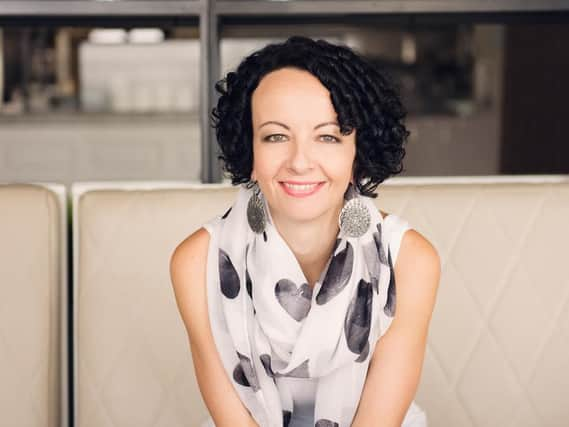Former Leyland woman escapes "spiral of guilt and shame" to beat disordered eating


That is the message of a food addiction therapist, formerly of Leyland, who struggled with obsessions over food and exercise for more than a decade.
Disorder eating covers a broad range of conditions, including anorexia, bulimia and binge eating disorder. Many people, like Rachel Foy, do not have every symptom of a problematic eating pattern but still face a painful daily battle with their mental health.
Advertisement
Hide AdAdvertisement
Hide AdRachel, an eating psychology coach and founder of Soul Fed Woman, was a healthy size 12 to 14 when she mentally hit crisis point because of an extreme cycle of dieting and binge eating.
The mum-of-two was just 14-years-old when she first started cutting calories, which gradually transformed into an obsession.
Rachel, now 41, said: "In high school, I felt like I didn't fit in and had a lot of self-esteem issues. I thought that if I went on a diet, I could control how I felt and that it might make people like me more. I thought I'd feel more seen, recognised and accepted by my peers."
But instead, her self-esteem hit a new low.
"I was very anxious about food and had obsessive-compulsive thoughts. If I ate something I thought was wrong, it would send me into a spiral of guilt and shame," she said.
Advertisement
Hide AdAdvertisement
Hide Ad"Everyday, I'd list everything I ate, and in hindsight I realise I was abusing exercise."
While she would cut calories excessively, Rachel says she was never underweight. Still, she was in constant emotional pain.
"For me, the problem was more about how I thought I looked than my actual size. I had anxiety about putting on weight and losing control, and it completely put my life on hold. It dominated everything," she added.
"I was thinking about my weight all the time and it affected my friendships because I'd always say no to things like going out for pizza with friends.
Advertisement
Hide AdAdvertisement
Hide Ad"I don't think it's possible to have a food dysfunction within a vacuum. It robbed me of my free time because I'd always be at the gym. I'd fill every space with burning calories."
Rachel would go from one extreme to the other: restricting her diet and fixating on how many calories she consumed each day; then bingeing on food to numb painful feelings of shame and anxiety. It was a vicious circle, with each extreme heightening the other.
"But when I was in that dark place, I didn't see it as a mental health problem," she added.
"I would blame myself, believing I didn't have enough willpower or self-control."
Advertisement
Hide AdAdvertisement
Hide AdFluctuating from one extreme to the other was emotionally exhausting, she says. But it wasn't until her relationship broke down that she finally sought professional help.
Rachel, who was living away from home in Germany at the time, said: "My friends were becoming worried about me because I was spiralling into a dark place.
"I began addressing other issues in therapy and realised that my diet obsession was connected to everything else. It was a symptom of my troubles and I was turning to food to cope."
Her battle lasted for an agonising 15 years. But now Rachel's relationship with food is completely different.
Advertisement
Hide AdAdvertisement
Hide Ad"I eat with enjoyment and have no emotional attachment to food anymore. I used to think chocolate is bad and apples are good and now it's an emotionally neutral topic," she said.
"Exercise is still a massive part of my life but now I do it for mental health reasons. It's nothing to do with burning calories anymore or compensating for binge eating. It's a way to feel mentally and physically strong.
"My mind now feels free and I have space in my life to live better because I'm not obsessing about food. It now has no effect on me. I still speak extensively about it but only to help others."
It is a world away from the dark hole she once felt trapped in.
Advertisement
Hide AdAdvertisement
Hide Ad"When you're in the cycle of eating dysfunction, you feel disempowered, like it is something beyond your control," she said.
After meeting her husband, Rachel moved back to the UK. Determined to help others triumph over their own obsessions, she left behind her career in marketing nearly 10 years ago and retrained as a food addiction therapist.
Commenting on the lessons she now teaches, she added: "It's OK to reach out for help. Food dysfunction is still a taboo topic and sufferers struggle with embarrassment and shame. More people are speaking about mental health but many women still don't make the connection with their relationship to food. The problem is so common.
"There are many eating disorder labels but if your anxiety doesn't fit under one of those, it is easy to think you don't have a problem. But this issue has nothing to do with actual body size or weight and everything to do with what is going on in your head.
Advertisement
Hide AdAdvertisement
Hide Ad"If food and exercise are dominating your thoughts and life, then you might need help."
How many people are affected by eating disorders?
Some 79 Lancashire girls aged 13 to 18 were admitted to hospital because of an eating disorder from 2016 to 2017, according to NHS Digital.
Meanwhile, 90 Lancashire women aged 26 to 40 were hospitalised over the same period.
For more information, visit https://www.beateatingdisorders.org.uk or to access help in the Preston area, see http://www.seedlancashire.co.uk/